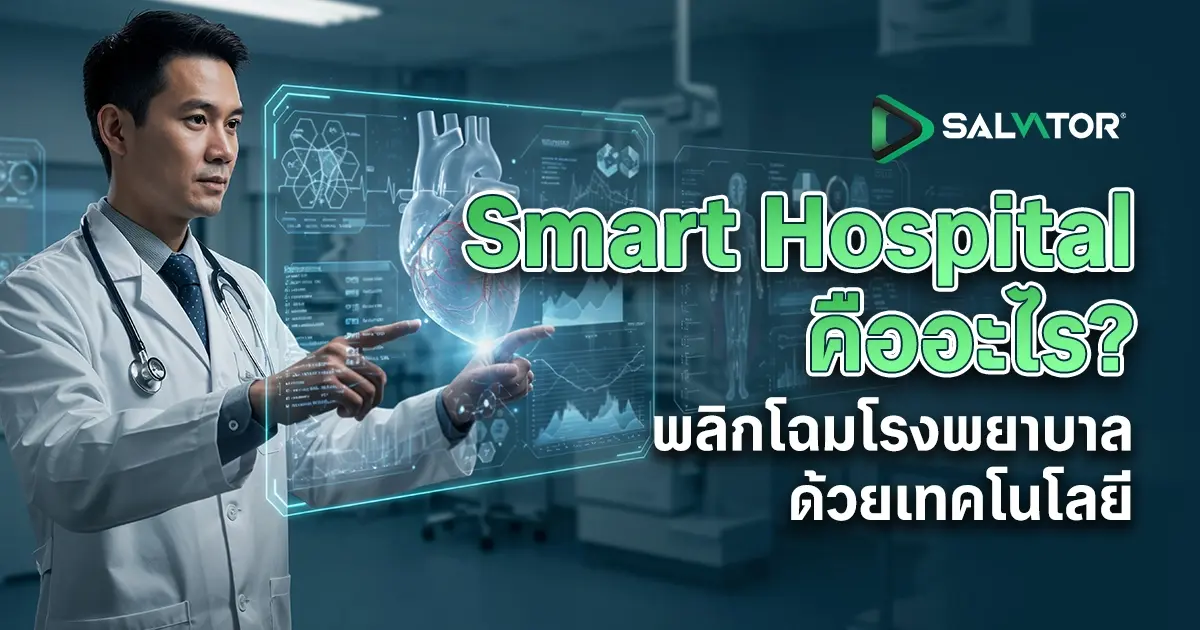What is a Smart Hospital? Revolutionizing Hospitals with Technology.

Table of Contents
Smart Hospital คืออะไร? เจาะลึกเทคโนโลยีโรงพยาบาลอัจฉริยะ ปี 2026
Smart Hospital (โรงพยาบาลอัจฉริยะ) คือ โรงพยาบาลที่นำเทคโนโลยีดิจิทัลขั้นสูง เช่น Internet of Things (IoT), ปัญญาประดิษฐ์ (AI), Big Data และ หุ่นยนต์ทางการแพทย์ มาเชื่อมโยงและบริหารจัดการระบบบริการสุขภาพทั้งระบบ เป้าหมายหลักคือการเพิ่มประสิทธิภาพการรักษา ลดขั้นตอนที่ซ้ำซ้อน และสร้างประสบการณ์ที่ดีที่สุดให้กับผู้ป่วย (Patient Experience) พร้อมทั้งลดภาระงานของบุคลากรทางการแพทย์
The primary objective is not simply to adopt new technologies, but to use them to:
- Increase efficiency: Reduce redundant steps and waiting times, and streamline operational processes.
- Enhance the quality of care: Provide doctors with complete and immediate access to patient data, enabling more accurate diagnoses and treatment plans.
- Improve the patient experience: Make receiving care easy, convenient, and less stressful.
- Lessen the burden on staff: Use automation and robots for tasks that don’t require advanced skills, freeing up medical personnel to focus on patient care.

องค์ประกอบสำคัญของ Smart Hospital มีอะไรบ้าง?
A Smart Hospital isn't driven by a single technology but by the collaboration of several key ones:
1. Internet of Things (IoT) และ IoMT: การใช้อุปกรณ์สวมใส่ (Wearable Devices) และเซ็นเซอร์ติดตามสัญญาณชีพผู้ป่วยแบบเรียลไทม์ เชื่อมต่อข้อมูลตรงสู่ Nurse Station โดยไม่ต้องเดินจดบันทึก
2. Artificial Intelligence (AI) และ Machine Learning: ใช้ AI ช่วยวินิจฉัยโรคจากภาพ CT Scan/MRI ได้แม่นยำและรวดเร็วกว่ามนุษย์ รวมถึงการใช้ AI คาดการณ์ความเสี่ยงของผู้ป่วย (Predictive Analytics)
3. Robotics (หุ่นยนต์ทางการแพทย์):
Medicine and Supply Delivery Robots: ลดภาระงานเดินส่งของของเจ้าหน้าที่
Cleaning Robots: ฆ่าเชื้อด้วยแสง UV-C อัตโนมัติ
หุ่นยนต์ต้อนรับ: ช่วยนำทางผู้ป่วยและตอบคำถามเบื้องต้น
4. Telemedicine (โทรเวชกรรม): ระบบปรึกษาแพทย์ออนไลน์ ช่วยให้ผู้ป่วยในพื้นที่ห่างไกลเข้าถึงการรักษาได้โดยไม่ต้องเดินทาง ลดความแออัดในโรงพยาบาล
5. Big Data & Cloud Computing: การจัดเก็บข้อมูลสุขภาพ (EHR) บนคลาวด์ที่ปลอดภัย เชื่อมโยงข้อมูลระหว่างแผนกและโรงพยาบาลในเครือข่ายได้อย่างไร้รอยต่อ
ประโยชน์ของ Smart Hospital (ทำไมต้องเปลี่ยน?)
| Features of the | โรงพยาบาลดั้งเดิม (Traditional) | โรงพยาบาลอัจฉริยะ (Smart Hospital) |
| การเข้าถึงข้อมูล | แฟ้มกระดาษ, ค้นหายาก | ข้อมูลดิจิทัล Real-time บน Cloud |
| การนัดหมาย | โทรศัพท์, รอคิวหน้าเคาน์เตอร์ | แอปพลิเคชัน, จองคิวออนไลน์ |
| การติดตามผู้ป่วย | ตรวจตามรอบเวลา | ติดตามตลอด 24 ชม. ผ่าน IoT |
| ความผิดพลาด | Human Error สูงกว่า | ลดความผิดพลาดด้วย AI และ Automation |
ประโยชน์ต่อผู้ป่วย
ลดเวลารอคอย: ด้วยระบบนัดหมายและคิวอัจฉริยะ
แม่นยำและปลอดภัย: AI ช่วยสแกนหาความผิดปกติที่อาจมองไม่เห็นด้วยตาเปล่า
สะดวกสบาย: เข้าถึงประวัติการรักษาและผลตรวจผ่านแอปพลิเคชันมือถือ
ประโยชน์ต่อโรงพยาบาล
บริหารทรัพยากรคุ้มค่า: ลดต้นทุนพลังงานและการใช้กระดาษ
แก้ปัญหาขาดแคลนบุคลากร: ใช้หุ่นยนต์ทำงานซ้ำซากแทนคน ให้บุคลากรโฟกัสที่การดูแลผู้ป่วย
How Must Hospitals Adapt to Become Smart Hospitals?
การเปลี่ยนผ่านไม่ใช่แค่การซื้ออุปกรณ์ แต่ต้องเตรียมพร้อมด้านโครงสร้างพื้นฐาน (Infrastructure):
Network Backbone: ติดตั้งระบบ Wi-Fi 6 หรือ 5G ให้ครอบคลุมทุกจุดเพื่อรองรับอุปกรณ์ IoT มหาศาล
Cybersecurity: วางระบบความปลอดภัยของข้อมูลตามมาตรฐาน PDPA อย่างเคร่งครัด
Physical Space: ปรับพื้นที่ทางเดินให้กว้างพอ (อย่างน้อย 120 ซม.) และพื้นเรียบ เพื่อให้หุ่นยนต์เดินสวนกันได้ รวมถึงลิฟต์ที่รองรับคำสั่งจากหุ่นยนต์
Real-World Examples of Smart Hospitals
- โรงพยาบาลราชวิถี: ใช้หุ่นยนต์ temiV1 ในการส่งผลตัวอย่างเลือดจากคลินิกไปยังห้อง Lab และใช้เป็น document sender robot ต่างๆภายในโรงพยาบาล ซึ่งลดภาระของเจ้าหน้าที่ของโรงพยาบาลในการเดินไป-เดินมาได้อย่างมาก
- ศิริราชพยาบาล (Siriraj Smart Hospital): ต้นแบบโรงพยาบาลอัจฉริยะ 5G แห่งแรกในอาเซียน มีระบบ Smart Logistics ด้วยรถไร้คนขับขนส่งยา และ Smart EMS รถพยาบาลอัจฉริยะที่ส่งข้อมูลชีพจรคนไข้หาหมอได้ก่อนถึงโรงพยาบาล
- Mount Sinai Hospital (New York, USA): Uses AI to analyze patient data to predict the risk of complications after surgery.
- Cleveland Clinic (Ohio, USA): Uses Big Data to analyze information and improve operational efficiency while reducing costs.
- Changi General Hospital (Singapore): Uses IoT to monitor patients' symptoms and an intelligent navigation system to help patients and their families move around the hospital.
The future of healthcare has already begun.
Smart Hospitals are no longer a distant concept but a direction that healthcare systems worldwide, including in Thailand, are moving towards. Investing in these technologies is an investment in a sustainable future, one that will provide everyone with access to safer, more effective, and higher-quality healthcare than ever before.
Request a Demo
Please provide your complete information.




















